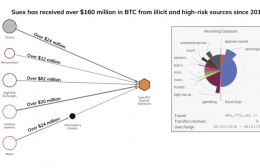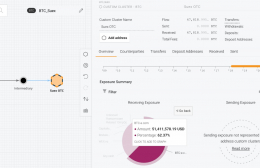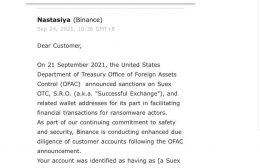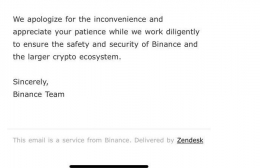Binance's Double Standard: Collaboration with the Suex Crime Center and Payments from WEX (BTC-e)
Thesis for the story:- BTC-exchange Suex is a criminal center for all financial dirt (criminal money flows) from the former Soviet Union, and in particular Russia, Ukraine - fact.
- Suex services were used by criminal personalities, hackers, hackers, drug dealers, financial pyramids, stolen cryptocurrency being cashed out - fact.
- There were stable business relations between Suex center and BTC-e (WEX) scam exchange and EXMO scam exchange.
- Suex's criminal center has had no problem for years servicing and laundering money on the Binance exchange, as has Finiko's pyramid scheme – it is a fact.
- The Binance exchange illegally withheld the criminal capitals of the former WEX (BTC-e) exchange and payments from the wallets of the former WEX (BTC-e) exchange still pass through it - a fact.
Now, let's discuss all these points in more detail, especially the inadequate behavior of Binance, their reaction to U.S. sanctions against Suex, double standards in the business processes of Binance casino.
US imposed sanctions against bitcoin exchanger Suex with offices in Russia
The U.S. Treasury Department has included cryptocurrency exchanger Suex with offices in Moscow and St. Petersburg, as well as 25 addresses in bitcoin, Ethereum and Tether networks on its sanctions list. According to the Office of Foreign Assets Control (OFAC), the operators of at least eight ransomwares, scam projects and darknet marketplaces passed through Suex.
Chainalysis, the analyst firm involved in the investigation, found that Suex has received more than $480 million in bitcoins since February 2018. At least $160 million of that amount was related to illegal activity.

Experts found that more than $50 million in cryptocurrency transactions were sent from addresses associated with the now-closed BTC-e (WEX) exchange. Moreover, most of them were carried out after the exchange was shut down:

More than $24 million linked to fraudulent cryptocurrency projects, including the Finiko financial pyramid. Another $20 million came from darknet platforms, including the Russian Hydra. Almost $13 million is linked to ransomware operators Ryuk, Conti, Maze and others. Analysts at Elliptic estimate that since 2018, Suex has processed at least $934 million in cryptocurrency transactions, over $370 million of which are linked to cybercriminals.
The legal entity of the exchanger is SUEX OTC s.r.o. - is registered in the Czech Republic. The largest shareholder of Suex is Russian Egor Petukhovsky. He is also the listing director of the popular Telegram bot for cryptocurrency exchange Chatex.
Analyst firm TRM Labs believes that both companies have significant corporate relationships. Suex was originally under the corporate ownership of the Estonian company Izibits OÜ, which still holds a local license as a virtual asset service provider. The Russian-language Suex website lists Izibits OÜ as its corporate owner. It is also the owner and operator of Chatex, a Telegram-based cryptocurrency exchange bot.
Suex.io is owned by St. Vincent-based Hightrade Finance Ltd. It is also mentioned in the Chatex User Agreement as a legal entity. According to OFAC documents, cryptocurrency exchange Suex is registered at two addresses. One is in Prague and the other is in Moscow City, in Suite Q on the 31st floor of the Federation Tower. Another office is in St. Petersburg.
Analysts name Czech venture capitalist Tibor Bokor and Russian Vasily Zhabykin as managers of the exchange. The latter owns 10% of Suex. According to Zhabykin's LinkedIn profile, he currently heads the NUUM neobank from the mobile operator MTS. Ildar Zakirov, Maxim Subbotin and Maxim Kurbangaleev are also associated with Suex. In an archived version of Egor Petukhovsky's personal blog, we found the story of Suex's creation, where he points out that Ildar [Zakirov] and Maxim [Subbotin] were partners.
Petukhovsky also notes that Ivan Petukhovsky, one of the founders of the EXMO exchange, played a "key role" in the emergence of Suex. According to the blog, Egor Petukhovsky had the first exchange with him for 4,000 USDT. According to the story, the first exchanges Suex conducted on EXMO. We asked for comments from the site. Stankevich also stressed that Ivan and Yegor Petukhovsky are namesakes, not relatives.
Both TRM Labs and Chainalysis stated that Suex is a "nested service", i.e. it works with addresses on larger exchanges (for example, Binance) using their liquidity and trading pairs. In other words - the exchanger does not provide storage services directly.
Millions of dollars from the WEX exchange (BTC-e) passed through the criminal center of Suex and Binance
Analytical company Chainalysis found out that bitcoin exchange Suex, included in the U.S. sanctions list, among other things, processed transactions from the now-closed cryptocurrency exchange WEX in the amount of several million dollars.
Earlier, experts reported that over $50 million in bitcoin were sent to Suex from the addresses of the BTC-e exchange, whose domain was seized by U.S. authorities in the summer of 2017. Most of the transfers were made after the exchange ceased operations, including in 2021. WEX was the legal successor of BTC-e and took over its debt obligations.
Chainalysis stressed that they are not aware of any corporate relationship between Suex, BTC-e and WEX.
"However, the volume of funds received from these exchanges to the exchanger, including after their official closure, suggests that a closer relationship probably existed between the platforms than between regular customers who do not know each other," the analysts said.
Suex co-owner Yegor Petukhovsky was able to find a photo of him in the WEX office in Moscow on social media:

On September 22, a channel appeared in Telegram, the author of which began to publish discrediting information about persons associated with the activities of Suex and the EXMO exchange. Less than a day later, the channel became unavailable. However, the author managed to publish a list of 13 transactions (one of them hash is invalid), totaling 654.1 BTC, allegedly received from WEX to one of the addresses of the exchanger. Most of the transfers are dated February 2021.
Crystal Blockchain product development director Kirill Chikhradze confirmed in a comment to ForkLog that all the listed transactions were indeed sent from WEX wallets:

The Suex wallet mentioned by the Telegram channel - 1Edue8XZCWNoDBNZgnQkCCivDyr9GEo4x6 - is a Binance deposit address. All outgoing transactions from it go to the exchange's hot wallet, Chikhradze added.
Indefibank CEO Sergey Mendeleev also broke down one of the transactions received on this wallet. According to him, on March 14, 2019, 3,501 BTC went out from one of the addresses belonging to the BTC-e exchange. Of these, 2,301 BTC went to an unknown non-custodial wallet. The rest of the funds, including through transactions specified in the Telegram channel, ended up on various exchanges, including the Binance address.
We have already considered separately how millions of stolen cryptocurrency went from skam exchange WEX (former BTC-e) to Binance and their fate is still unknown, more material in the article Binance - the story of missing assets of Cryptopia and btc-e (WEX).
Dmitry Vasilyev, ex-head of the Russian cryptocurrency exchange WEX (BTC-e), was arrested in Poland
Since, we are considering the connection between the criminal Russian centers WEX (BTC-e) and Suex, it is not superfluous to add news about the arrest of the former head of the Russian crypto-exchange WEX (BTC-e) Dmitry Vasilyev:
"The former head of the cryptocurrency exchange Wex Dmitry Vasilyev, from the accounts of which 450 million dollars disappeared, is sitting in the Warsaw detention center," writes the publication.
The detention occurred on August 11, but it has only become known now. According to Wyborcza, Wex management is responsible for the disappearance of money from investors in the European Union, including Poland. District Court in Warsaw has repeatedly extended the arrest of Vasilyev - most recently until September 21, according to the publication.
At the same time Poland has no claims to Vasilyev, but he is wanted by Interpol in Kazakhstan, where he is criminally prosecuted for fraud. Two years ago he was already arrested in Italy, but then he managed to return to Russia. The extradition of the detainee to Kazakhstan is currently under consideration.
Vasilyev was in charge of servicing trades on the BTC-e exchange, which closed in mid-2017 after the arrest in Greece of one of the alleged administrators of the site, Russian citizen Alexander Vinnik. The exchange soon relaunched under the name Wex, and Vasilyev became its director and was listed as the sole owner of World Exchange Services, a legal entity registered in Singapore.
In the summer of 2018, Wex stopped processing customer withdrawal requests, and by the end of the year, it closed down altogether. After Wex closed, Vasilyev tried to engage in other crypto-projects and, according to media reports, recently lived in St. Petersburg.
According to investigators, in September 2018, he misled an Almaty resident with the help of a cryptocurrency exchange and stole $20,000. After his arrest in Italy in the summer of 2019, he was released a few weeks later, reportedly due to errors in an extradition request. Now Kazakhstan is seeking the detainee's extradition a second time.
Binance deleted the accounts of bitcoin exchange Suex
Binance cryptocurrency casino clown Changpeng Zhao allegedly approved the inclusion of bitcoin exchanger Suex on the US sanctions list and shared details of his involvement in the investigation, in other words by any means he serves the US government and law enforcement agencies - when it is already late, Suex has laundered money on Binance for years, and reaction came only after Suex was added to the US sanctions list. Apparently, Changpeng Zhao forgot about the line from the US DOJ "No need to thank Binance for assisting in investigations" - no indulgence for criminal activities of Binance will be given, but first they will swallow "small fish", then they will take up Binance:

He reminded that Binance cooperates with law enforcement agencies around the world on a daily basis to stop illegal activity. Only why, Binance has not been able to see this "illegal" activity for many years is a question. Why Binance serves pyramid schemes (Finiko) is the question. Why Binance still accepts payments from marked crypto wallets of ex-WEX exchange (BTC-e) is a question. Apparently, even former Europol darknet specialist Nils Andersen-Röed, who joined Binance's security team, is not able to change Binance's criminal activity and criminal business model.
And when finally, Binance itself is recognized as a criminal hub for financial asset laundering, manipulation and fraud, not just its customers (partners).
"We have refined our approach to investigating potentially illegal activity using AI and creating an internal investigative team of experienced law enforcement officers," CZ wrote.
ПBased on their audit, several accounts linked to Suex addresses were identified earlier this year. Pursuant to internal security measures, they were removed from the platform. Binance passed all information about the addresses and other details of the internal investigation to law enforcement agencies. Overall, CZ called the sanctions against bitcoin exchanger Suex a positive development for the industry and a trajectory for its development.
Funds in ex-WEX (BTC-e) accounts go to Binance
An unknown person transferred 100 ETH ($345,385 at the time of the transaction) from the wallet of bitcoin exchange WEX. The funds arrived ... to Binance.
This is the first withdrawal from the wallet of the bankrupt exchange in the last three years. Its cumulative balance currently stands at 9,916 ETH ($34.2 million). Despite the fact that the wallets of the ex-market WEX (BTC-e) are known and have the corresponding tokens, Binance did not prevent in any way the transfer and in no way reacted to this transfer, even in spite of the public coverage of the transfer. The laundering of stolen money by ex-WEX (BTC-e) to Binance is apparently the norm, which the exchange representatives and Changpeng Zhao directly talk about all the time.
In October 2018, the Binance exchange froze accounts that received 93,000 ETH from wallets associated with WEX. As of this writing, the value of these assets exceeds $321 million. The fate of these assets is still unknown and is fully managed by Binance.
Ridiculous: Binance has blocked a customer's account for a transaction to a Suex exchange address
The Binance exchange knows and loves to surprise with its double standards, its fraud, its folly. On September 22, the cryptocurrency exchange Binance blocked the account of a user without warning. The platform later explained that he had allegedly sent funds to the address of the US-sanctioned bitcoin exchange Suex. The user denied carrying out transactions in favor of the exchanger or the darknet marketplace:


According to the victim, he never personally used Suex:
"A year ago I made a $1700 transfer from Binance to the address of an acquaintance who provided it as his personal address. Now it turned out that this was the address of Suex, which is on the sanctions list. And it's an internal Binance account."
The user added that he knew the recipient of the transaction personally, he is a trader. According to his assumption, his friend gave the address of Suex, because he wanted to withdraw money through the exchanger. The user stressed that the real reason for the blocking was not immediately reported to him:
"I first tried to reactivate my account using advice from Binance's FAQ. I answered several questions about my account status and passed Face Verification. I was told that my account cannot be unfrozen automatically and I have to go to support. In the chat my message was sent to a special service for consideration until 27th of September.
Twenty-four hours later, another specialist wrote him that he had allegedly violated the Terms of Use and his account was now under investigation:
"There was no mention of Suex. The support wrote that it was only worth waiting for. And the next day, September 24, a letter arrived about the alleged link to Suex. Along with it came another letter saying that the account reactivation failed."
A partner of the Kiev office of Briefcase Artem Kotov, defending the interests of the victim user, said that he personally knows of at least six more similar cases. The amount of blocked funds in each of the accounts exceeds $100,000.
"At the moment it is too hasty to talk about the judicial perspective of the situation, but from those cases that have already come before us, we see that the best solution is a preliminary communication with Binance support," - said the lawyer.
It is possible to conclude the Agreement NDA and receive nothing, Binance from time to time arranges and such tricks to the users:
"In practice, Binance has long ignored elementary verification procedures as they were necessary to verify the assets entering the exchange, thus endangering its users' assets and providing loopholes for dirty assets to enter the exchange," Kotov said.
According to him, if Binance refuses to unblock users' accounts, Briefcase will resort to all possible ways to protect the rights of clients, including initiating regulatory checks on the exchange activities in various jurisdictions, up to trial.
Binance representatives said the following, but neglected to point out that the "transfer to a sanctioned Suex address" was more than 1 year ago, when Suex was not on the sanctions list:
"We have determined that some user accounts are linked to Suex sanctioned addresses. In response to OFAC's decision, Binance is investigating the exchanger."
28.09.21
Search by keyword:
